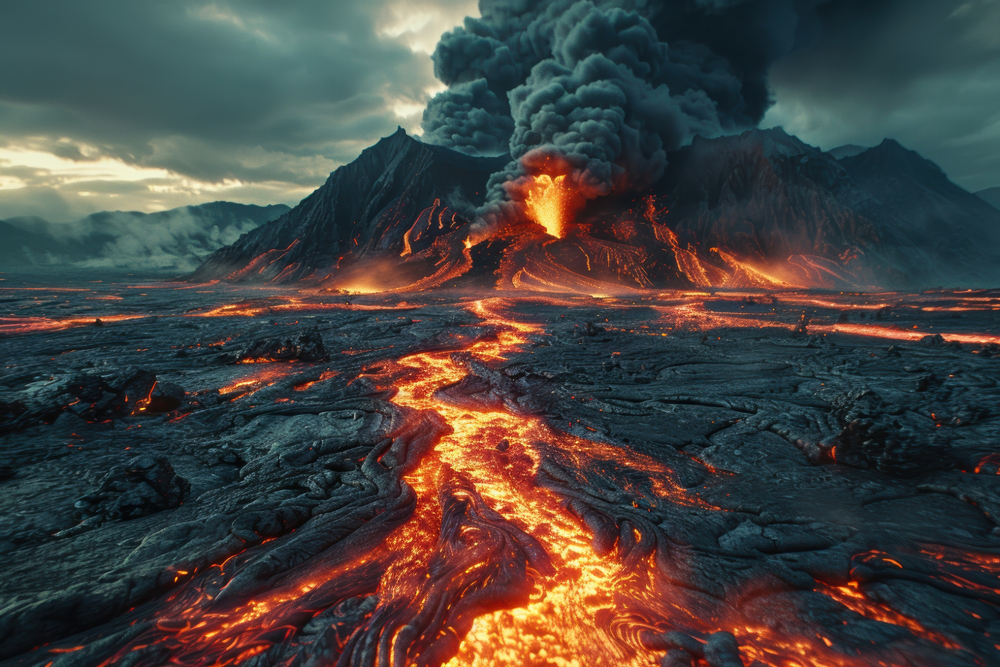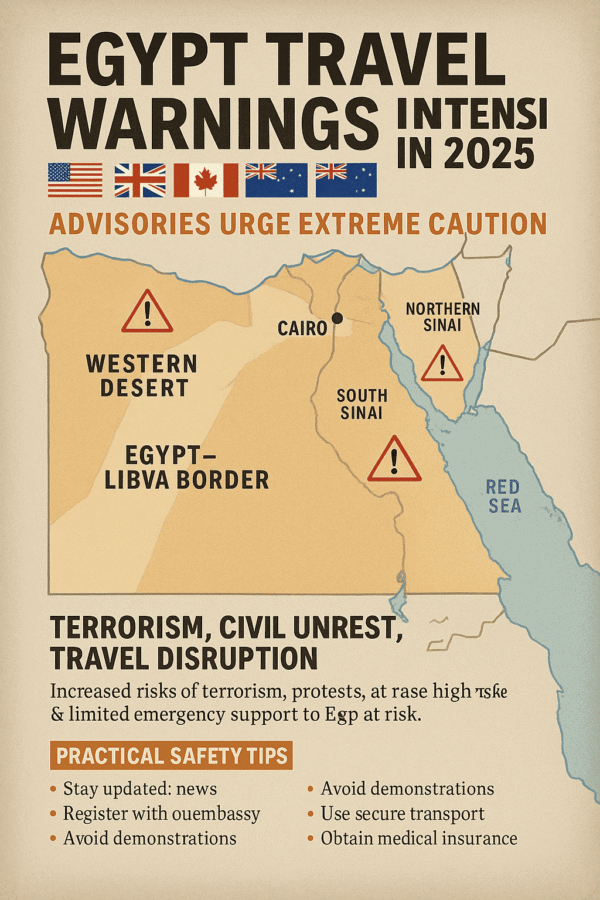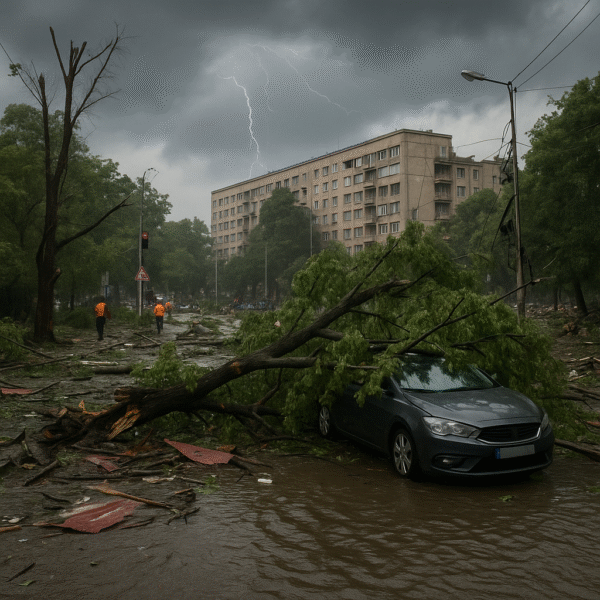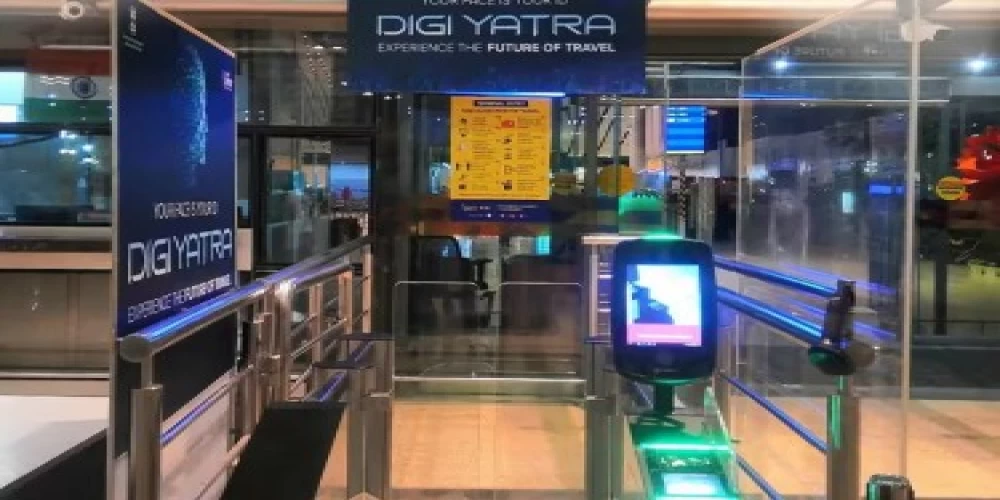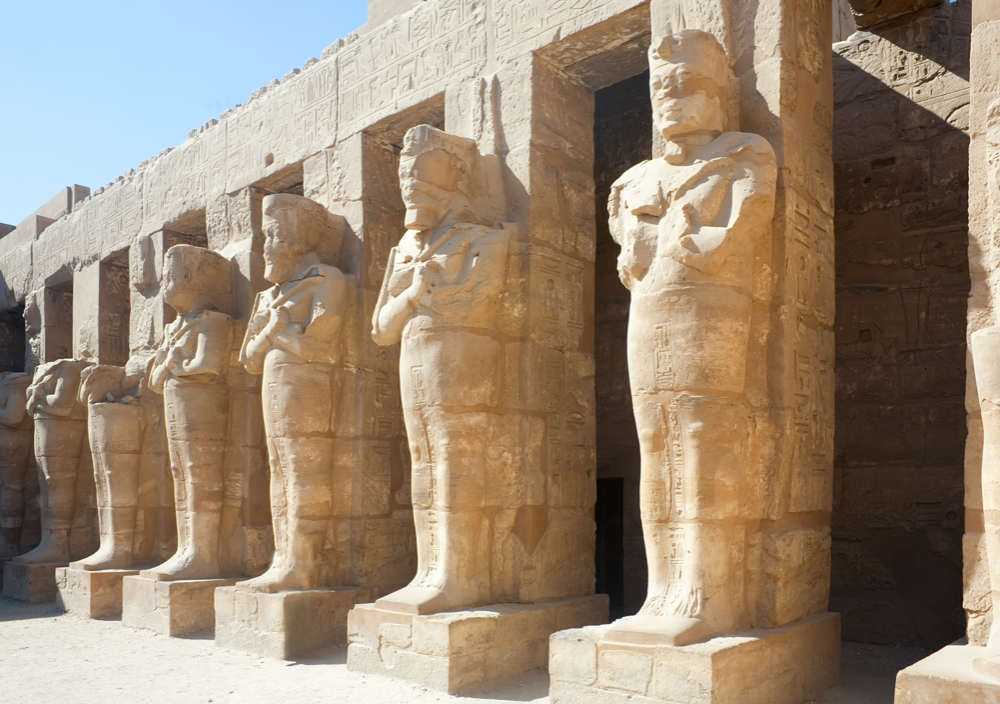Cairo, Egypt – The United States, Canada, Australia, New Zealand, and the United Kingdom have issued coordinated travel advisories warning their citizens against non-essential travel to Egypt due to escalating security threats. This unprecedented joint action highlights the increasing risks faced by foreign nationals amid growing instability in Egypt’s Sinai Peninsula, Western Desert, and border regions.
According to the advisories, travelers may encounter terrorist activity, civil unrest, sudden travel disruptions, and limited emergency support across several regions in Egypt. These warnings come as part of a broader global response to volatile geopolitical developments and the rise in anti-Western sentiment.
Egypt’s Most Dangerous Areas: Sinai Peninsula and Western Desert
The North Sinai Governorate remains Egypt’s most dangerous region, with all five nations warning against all travelto the area. The region has seen a surge in extremist insurgencies, with terrorist groups regularly targeting Egyptian military and police forces using roadside bombs, IEDs, and ambushes.
Likewise, the Western Desert, especially areas near the Libyan border, has been flagged due to militant activity, human trafficking, and smuggling operations. Several governments noted that armed groups operate with little resistance in these remote zones, and kidnapping risks remain high.
Inland travel to lesser-policed regions is discouraged across all advisories, with governments urging citizens to stay within secure, urban areas or resort towns with strong security infrastructure.
United States: Heightened Caution Urged for All Travelers to Egypt
The U.S. Department of State has updated its Level 3: Reconsider Travel advisory for Egypt, citing risks related to terrorism, civil unrest, arbitrary arrests, and limited access to emergency health services. U.S. citizens are explicitly advised to avoid:
- Northern and Central Sinai due to terrorism.
- The Western Desert due to insurgency risks.
- Demonstration-prone urban areas like Cairo and Alexandria.
The U.S. Embassy in Cairo has urged travelers to enroll in the Smart Traveler Enrollment Program (STEP) to receive real-time security updates and assistance if needed.
United Kingdom: Advises Against All Travel to Sinai and Border Regions
The UK’s Foreign, Commonwealth & Development Office (FCDO) has issued one of the most stringent advisories, warning against all travel to North Sinai and areas within 20 kilometers of the Libya border. The FCDO also discourages non-essential travel to northern South Sinai, particularly beyond the St. Catherine–Nuweiba Road, due to ongoing terrorist threats.
While Sharm El Sheikh remains open to tourism, UK travelers are advised to remain within secured zones and avoid excursions to inland areas or isolated coastal routes.
Canada: High-Risk Zones and Health Infrastructure Concerns
Global Affairs Canada urges Canadian citizens to exercise a high degree of caution in Egypt, particularly in regions affected by military operations and extremist activity. Specific warnings include:
- Avoid all travel to North Sinai and the Western Desert.
- Reconsider non-essential travel to northern parts of South Sinai.
- Prepare for limited emergency medical services outside major cities.
Canadians are also encouraged to register with the Registration of Canadians Abroad system for updates and consular support.
Australia: Security Environment Volatile Across Egypt
Australia’s Department of Foreign Affairs and Trade (DFAT) strongly advises against travel to:
- Northern Sinai, due to ongoing terrorism and military engagements.
- Western Desert and Libya border regions, citing criminal networks and militant activity.
- Even tourist hubs such as Sharm El Sheikh, though generally safer, require increased vigilance due to their symbolic target value.
Australian officials also highlighted security volatility, emphasizing that threat levels may escalate without warning, potentially leading to roadblocks, airport shutdowns, or curfews.
New Zealand: Infrastructure Limitations and Terrorism Threats
The New Zealand Ministry of Foreign Affairs and Trade (MFAT) has issued a travel advisory recommending heightened caution due to:
- Terrorism risk in North Sinai and South Sinai interior.
- Militant activity near the Libya border.
- Limited emergency response capacity, particularly in rural and desert areas.
New Zealand also advises travelers to avoid public gatherings, remain updated through local media, and ensure travel insurance includes medical evacuation coverage.
Egypt Travel Safety Tips for Foreign Visitors
While Egypt remains one of the world’s most iconic tourist destinations, featuring the Pyramids of Giza, Valley of the Kings, and the Red Sea resorts, current conditions demand strategic preparation and cautious movement. Travelers should:
- Avoid protest sites, especially in Cairo, Luxor, and Suez.
- Stay inside secure accommodation zones with verified transportation.
- Use ride-hailing apps like Uber in cities rather than hailing taxis.
- Purchase comprehensive travel insurance, including coverage for terrorism and medical evacuation.
- Dress conservatively, avoid public displays of affection, and refrain from discussing politics in public.
- Monitor travel.gc.ca, travel.state.gov, or your nation’s embassy for regular updates.
Key Takeaways from Coordinated Egypt Travel Warnings
| Country | Do Not Travel Areas | Key Concerns |
|---|---|---|
| United States | Northern Sinai, Western Desert | Terrorism, arbitrary arrests, weak medical system |
| United Kingdom | North Sinai, Libya border, parts of South Sinai | Military conflict, drone strikes, public unrest |
| Canada | North Sinai, Western Desert | Kidnappings, terrorism, limited healthcare |
| Australia | Northern Sinai, Libya border, interior Sinai | Militant activity, sudden unrest |
| New Zealand | North Sinai, Libya border | Insurgency threats, poor infrastructure |
Final Word: Proceed with Extreme Caution
The synchronized issuance of travel advisories for Egypt by five leading Western governments underscores an alarming rise in regional insecurity. While Egypt’s rich historical heritage and natural beauty continue to attract global travelers, it is critical to remain informed, prepared, and cautious.
Before traveling to Egypt, register with your national embassy, avoid high-risk zones, purchase travel insurance with evacuation coverage, and follow real-time updates. The situation may evolve quickly—safe travel begins with situational awareness.
For more travel news like this, keep reading Global Travel Wire




